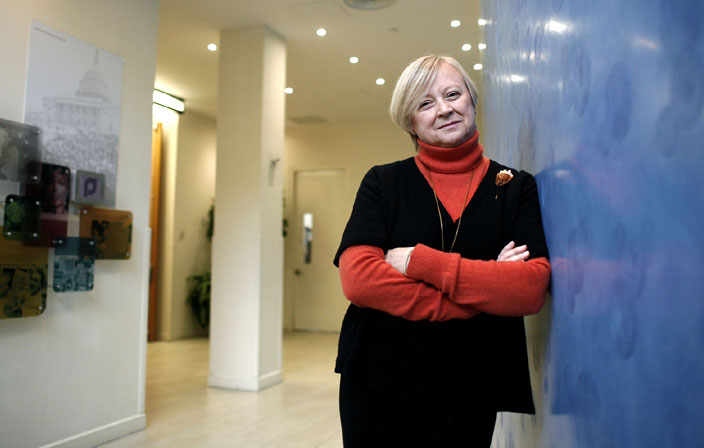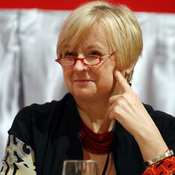Frances Kissling
The Good in the Other, the Doubt in Ourselves
“You’ve got to be willing to risk in order to make change. You’ve got to approach differences with the notion that there is good in the other.” Scholar and activist Frances Kissling speaks of good will and understanding, rather than agreement or victory, as bridges between difference.

Image by Krisanne Johnson/The New York Times, © All Rights Reserved.
Guest

Frances Kissling is president of the Center for Health, Ethics and Social Policy. She was the president of Catholics for Choice from 1982 until 2007.
Transcript
KRISTA TIPPETT, HOST: I wish I could throw Elizabeth Alexander’s question by way of poetry, “Are we not of interest to each other?” into town hall meetings, the halls of Congress, and let it roll around for a while.
Our cultural mode of debating issues by way of competing certainties comes with a drive to resolution. We want others to acknowledge that our answers are right. We call the debate or get on the same page or take a vote and move on. The alternative involves a different orientation to the point of conversing in the first place: to invite searching — not on who is right and who is wrong and the arguments on every side; not on whether we can agree; but on what is at stake in human terms for us all. There is value in learning to speak together honestly and relate to each other with dignity, without rushing to common ground that would leave all the hard questions hanging.
Frances Kissling is best known as a pro-choice advocate, the longtime head of Catholics for Choice. Less famously, when she retired from Catholics for Choice a decade ago, she decided to give herself over to learning what it would mean to be in real relationship with her political opposites. She’s steeped in the particular context of reproductive rights, but what she’s learned applies to every sphere.
Ms. Frances Kissling : I think that common ground can be found between people who do not have deep, deep differences. And in politics you can find compromise. Politics is the art of the possible. But I do think that when people who disagree with each other come together with a goal of gaining a better understanding of why the other believes what they do, good things come of that. But the pressure of coming to agreement works against really understanding each other. And we don’t understand each other.
The polarization that exists on the abortion issue, in which people have called each other names and demonized each other for decades, definitely speaks against any level of trust that enables people to come to some commonality. So you really have to start with this first idea, that there are some people — not all — who see some benefit in learning why the other thinks the way that they do. Some of it’s the simple stuff of humanization — that the person becomes a real person, not an extremist, not evilly motivated; that perhaps for some you can overcome the epithets that we have charged each other with. And that, I’m a very strong believer in.
I have learned — I have changed my views on some aspects of abortion over the last 10 years, based upon having a deeper understanding of the values and concerns of people who disagree with me. As a result, I have an interest in trying to find a way that I can honor some of their values without giving up mine. That’s, for me, what has happened.
Ms. Tippett : I want to read you something that you wrote. You were listing a couple of qualities that you thought were necessary to bring constructive, forward thinking approaches to a difficult issue. One of them that really struck me was “the courage to be vulnerable in front of those we passionately disagree with.”
Ms. Kissling : I think that’s the hardest thing to do. It is very hard for all of us in these situations to acknowledge, for example, that we just don’t have the answers to this problem. I don’t think we have the answers to the problem of abortion in our society, whether it’s the problem of abortion itself or the problem of how we’re going to mediate our differences about abortion.
And a willingness to admit that is very, very difficult. What is it in your own position that gives you trouble? What is it in the position of the other that you are attracted to? Where do you have doubts? I’ve said this to somebody recently: I don’t understand how you can work on an issue for 35 years as complicated as this and never change your mind at all about anything. What we’ve been doing hasn’t been working. I think that you become more willing to be vulnerable at a moment when you recognize that what you have done has not gotten you where you want to be. So an element of vulnerability is some modicum of helplessness. And if you don’t think you need any help and you think everything is just hunky-dory, well, then, there’s absolutely no reason to be vulnerable.
Ms. Tippett : What do you think you’ve learned about how social change happens? What would progress look like now in these years ahead?
Ms. Kissling : That’s a very difficult question. What have I learned? The need to approach others positively and with enthusiasm for difference is absolutely critical to any change. There is no way to change somebody. I’m the toughest of fighters, let’s be very clear. My reputation for being devastating in debate is legendary, and I love a good fight and I love to win. But what I have learned is that, you know, the simplistic way of putting it is that you can catch more flies with honey than vinegar. That’s a very wise saying.
And I have learned that people in the center are not going to be the big change makers. You’ve got to put yourself at the margins and be willing to risk in order to make change. More importantly, you have got to approach differences with this notion that there is good in the other. That’s it. And that if we can’t figure out how to do that, and if there isn’t the crack in the middle where there’s some people on both sides who absolutely refuse to see the other as evil, this is going to continue. There’s a lot of pressure, and it’s much easier, to preach to the choir versus listening to people who disagree with you. But the choir is already there; the choir doesn’t need us.







Reflections